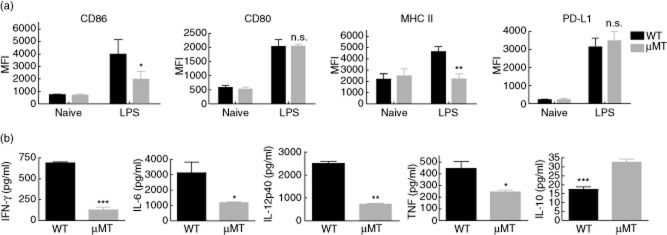Figure 3.

Liver myeloid dendritic cells (mDCs) from B cell-competent mice are more responsive to lipopolysaccharide (LPS) and secrete greater levels of proinflammatory cytokines but less interleukin (IL)-10 than those from B cell-deficient mice. (a) Liver non-parenchymal cells (NPC) were isolated from LPS-treated or control mice after 18 h and analysed for the expression of CD86 and programmed cell death 1 ligand 1 (PD-L1) on mDCs (B220–CD11chigh). In response to in-vivo LPS stimulation, B cell-deficient mice exhibited lower levels of CD86 and major histocompatibility complex (MHC) II, but not PD-L1 expression on liver mDCs when compared with wild-type mice. Data are pooled from two separate experiments, with three, three, two and three mice in groups of wild-type naive, wild-type LPS, μMT naive and μMT LPS, respectively. (b) Liver mDCs (CD3–CD19–NK1·1–plasmacytoid dendritic cell antigen-1 (PDCA-1)–CD11c+) were enriched using immunomagnetic beads, followed by in-vitro LPS stimulation for 48 h to measure levels of interferon (IFN)-γ, interleukin (I)L-6, IL-12p40,tumour necrosis factor (TNF)-α and IL-10 secretion. In response to in-vitro LPS stimulation, liver mDCs from B cell-deficient mice produced less proinflammatory IFN-γ, IL-6, IL-12p40 and TNF-α and more regulatory IL-10.
